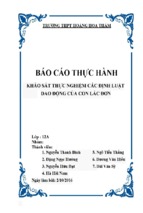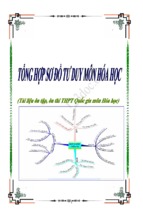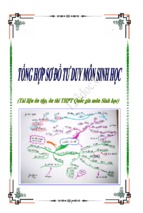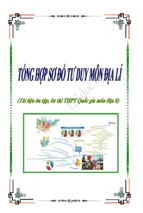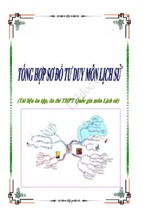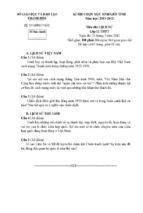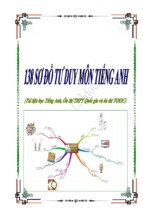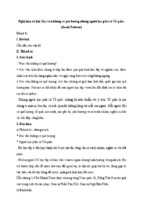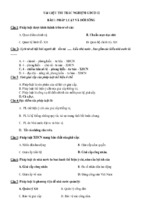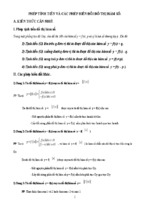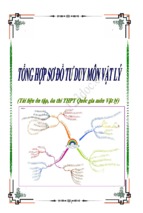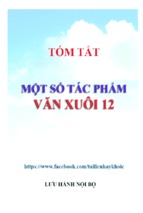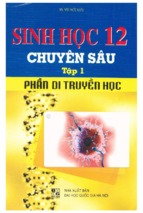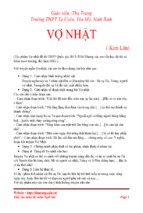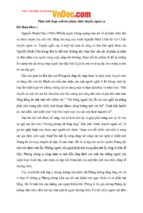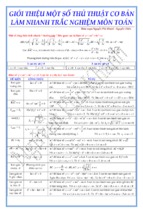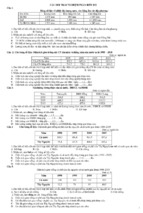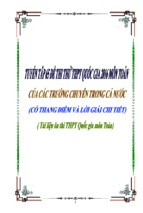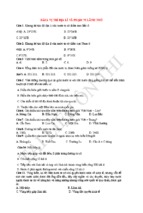ĐỀ THI TIẾNG ANH số 1 (30 PHÚT)
Mark the letter A, B, C or D on your answer sheet to indicate the
word whose underlined part differs from the other three in
pronunciation in each of the following questions.
Question 1.
( A ) stopped
( B ) decided
( C ) hated
( D ) wanted
Mark the letter A, B, C or D on your answer sheet to indicate the
word that differs from the other three in the position of primary
stress in each of the following questions.
Question 2.
( A ) providential
( B ) acceptable
( C ) available
( D ) responsible
Mark the letter A, B, C or D on your answer sheet to indicate the
underlined part that needs correction in each of the following
questions.
Question 3. The students in class 12A3 complain that
sometimes their English teacher arrives lately for class.
( A ) The students
( B ) complain that
( C ) their
( D ) lately
Question 4. He passed the exams with high scores, that made
his parents happy.
( A ) He
( B ) with
( C ) that
( D ) happy
Mark the letter A, B, C or D on your answer sheet to indicate the
correct answer to each of the following questions.
Question 5. Better life habits can reduce your ______ of getting
a heart attack.
( A ) emergency
( B ) danger
( C ) risk
( D ) threat
Question 6. "Is swimming under water very difficult?" - "No, it’s
just a matter _____ able to control your breathing."
( A ) being
( B ) that you are
( C ) of being
( D ) to be
Question 7. Rarely have I visited ______ Lijubljana, the capital
of Slovenia.
( A ) as beautiful a city as
( B ) as beautiful as the city
( C ) as a city as beautiful as
( D ) as a beautiful city as
Question 8. Let's go for a long walk, ______?
( A ) do you
( B ) will you
( C ) shall we
( D ) don't you
Question 9. The mother is very ______ about the health of her
little son.
( A ) careful
( B ) nervous
( C ) confused
( D ) concerned
Question 10. She got ______ her car to pick ______ some wild
flowers.
( A ) in - at
( B ) from - on
( C ) off - up
( D ) out - for
Mark the letter A, B, C or D on your answer sheet to indicate the
most suitable response to complete each of the following
exchanges.
Question 11. Brayan: "I'm applying for Toronto University." Aden: "_______!"
( A ) All right
( B ) Congratulations
( C ) Good luck
( D ) Certainly
Question 12. Kobe: "I still can't get accustomed to it!" Cadence: "__________"
( A ) You're hopeless!
( B ) You're welcome.
( C ) It was nice of you.
( D ) Sounds easy enough.
Mark the letter A, B, C or D on your answer sheet to indicate the
the word(s) CLOSEST in meaning to the underlined word(s) in
each of the following questions.
Question 13. People who hunt animals illegaly will be arrested
by the authorities.
( A ) breeders
( B ) robbers
( C ) hunters
( D ) poachers
Mark the letter A, B, C or D on your answer sheet to indicate the
the word(s) OPPOSITE in meaning to the underlined word(s) in
each of the following questions.
Question 14. In 1879, the success of his realistic novel, The Red
Room, fixed universal attention upon his talent.
( A ) impractical
( B ) cognitive
( C ) inrealistic
( D ) rational
Question 15. Certain rich nations use too much of the world's
energy supply.
( A ) consume
( B ) utilize
( C ) buy
( D ) produce
Mark the letter A, B, C, or D on your answer sheet to indicate
the sentence that is closest in meaning to each of the following
questions.
Question 16. While recycling has caught the public imagination,
reducing waste has attracted much less attention.
( A ) It is not generally known that reducing waste is more
effective than recycling
( B ) Recycling is not necessarily the best way of reducing
waste, according to the public
( C ) People are more interested in recovery and reuse than in
creating less rubbish
( D ) Using things again is the best way to reduce the amount of
rubbish.
Question 17. Color didn't really arrive in film-making until the
1950s.
( A ) There were no color films in the 1950s.
( B ) It wasn't until the 1950s that color really arrived in filmmaking.
( C ) It was until the 1950s that color really arrived in filmmaking.
( D ) Not until the 1950s that cinema really arrived in filmmaking.
Mark the letter A, B, C, or D on your answer sheet to indicate
the sentence that best combines each pair of sentences in the
following questions.
Question 18. He had a weak heart. He couldn't walk very far.
( A ) His heart was too weak that he couldn't walk very far
( B ) His heart was so weak that he couldn't walk very far.
( C ) His heart was such weak that he couldn't walk very far.
( D ) He had a very weak heart that he couldn't walk very far.
Read the following passage and mark the letter A, B, C, or D on
your answer sheet to indicate the correct word or phrase that
best fits each of the numbered blanks.
Last summer Paul went on holiday for two weeks to the
island of Sardinia. He (19) _____ in a hotel which had a
wonderful swimming stayed and beautiful views of the sea. It
was in a village where the local people went (20) _____ in the
winter, and foreign visitors came in the summer.
Paul spent his pool day on the beach, but on the second day
he felt very ill. First he was too hot, then he was too cold. He
couldn't understand why he felt (21) _____ that. Therefore, he
went to see the local doctor, who was a very nice man, and
fishing English was excellent.
"Summer is a time when people often feel ill," the doctor
said. "It's too hot for most of us! (22) _____ this medicine, and
stay out of the sun." Paul took the doctor's first and stayed in
his room for the rest of his holiday. He soon felt better. "(23)
_____ a cheap holiday!" he thought happily.
Question 19.
( A ) hired
( B ) lived
( C ) stayed
( D ) rented
Question 20.
( A ) to fish
( B ) fishing
( C ) catch fish
( D ) fish
Question 21.
( A ) as
( B ) so
( C ) like
( D ) but
Question 22.
( A ) Eat
( B ) Drink
( C ) Have
( D ) Take
Question 23.
( A ) It
( B ) That
( C ) How
( D ) What
Read the following passage and mark the letter A, B, C, or D on
your answer sheet to indicate the correct answer to each of the
following questions.
Humans have struggled against weeds since the
beginnings of agriculture. Marring our gardens is one of the
milder effects of weeds – any plants that thrive where they are
unwanted. They clog waterways, destroy wildlife habitats, and
impede farming. Their spread eliminates grazing areas and
accounts for one-third of all crop loss. They compete for
sunlight, nutrients, and water with useful plants.
The global need for weed control had been answered
mainly by the chemical industry. Its herbicides are effective and
sometimes necessary, but some pose serious problems,
particularly if misused. Toxic compounds threaten animal and
public health when they accumulate in food plants,
groundwater, and drinking water. They also harm workers who
apply them.
In recent years, the chemical industry has introduced
several herbicides that are more ecologically sound. Yet new
chemicals alone cannot solve the world’s weed problems.
Hence, scientists are exploring the innate weed-killing powers
of living organisms, primarily insects and microorganisms.
The biological agents now in use are environmentally
benign and are harmless to humans. They can be chosen for
their ability to attack selected targets and leave crops and other
plants untouched. In contrast, some of the most effective
chemicals kill virtually all the plants they come in contact with,
sparing only those that are naturally resistant or have been
genetically modified for resistance. Furthermore, a number of
biological agents can be administered only once, after which no
added applications are needed. Chemicals typically must be
used several times per growing season.
Question 24. With what topic does this passage primarily deal?
( A ) A proposal to ban the use of all herbicides.
( B ) The importance of the chemical industry.
( C ) Advantages of biological agents over chemical ones.
( D ) The dangers of toxic chemicals.
Question 25. The word "clog" in bold is closest in meaning to
__________.
( A ) drain
( B ) grow along
( C ) obstruct
( D ) float on
Question 26. Which of the following terms does the author
define in the first paragraph?
( A ) grazing area
( B ) nutrients
( C ) weeds
( D ) wildlife habitats
Question 27. Which of the following is NOT given as an
advantage of using biological agents over chemical herbicides?
( A ) They do not have to be used as often.
( B ) They are less likely to destroy desirable plants.
( C ) They are safer for workers.
( D ) They are more easily available.
Question 28. According to the passage, biological agents mainly
consist of __________.
( A ) weeds
( B ) useful plants
( C ) herbicides
( D ) insects and microorganisms
Question 29. The word "innate" in bold is closest in meaning to
__________.
( A ) natural
( B ) effective
( C ) organic
( D ) active
Question 30. Which of the following best describes the
organization of the passage?
( A ) A recommendation is analyzed and rejected.
( B ) A problem is described and possible solutions are
discussed.
( C ) A general idea is introduced and several specific examples
are given.
( D ) Two possible causes of a phenomenon are compared.
ĐÁP ÁN
Mark the letter A, B, C or D on your answer sheet to indicate the
word whose underlined part differs from the other three in
pronunciation in each of the following questions.
Question 1.
( A ) stopped
( B ) decided
( C ) hated
( D ) wanted
Giải thích: Đuôi "ed" trong đáp án này phát âm là /t/, các từ
còn lại đuôi "ed" phát âm là /id/.
Mark the letter A, B, C or D on your answer sheet to indicate the
word that differs from the other three in the position of primary
stress in each of the following questions.
Question 2.
( A ) providential
( B ) acceptable
( C ) available
( D ) responsible
Giải thích: provi'dential - trọng âm rơi vào âm tiết thứ ba, các từ
còn lại trọng âm rơi vào âm tiết thứ 2.
Mark the letter A, B, C or D on your answer sheet to indicate the
underlined part that needs correction in each of the following
questions.
Question 3. The students in class 12A3 complain that
sometimes their English teacher arrives lately for class.
( A ) The students
( B ) complain that
( C ) their
( D ) lately
Giải thích: Sửa: "lately" >> "late". Đến muộn là "arrive late"
chứ không phải là "arrive lately". ("Lately": gần đây).
Question 4. He passed the exams with high scores, that made
his parents happy.
( A ) He
( B ) with
( C ) that
( D ) happy
Giải thích: Sửa: "that" >> "which". Mệnh đề quan hệ xác định
thì không được dùng "that". Nhớ đơn giản là sau dấu "," thì
không được dùng "that" mà phải dùng "which".
Mark the letter A, B, C or D on your answer sheet to indicate the
correct answer to each of the following questions.
Question 5. Better life habits can reduce your ______ of getting
a heart attack.
( A ) emergency
( B ) danger
( C ) risk
( D ) threat
Giải thích: risk (n): nguy cơ; emergency (n): khẩn cấp; threat
(n): mối đe dọa; danger (n): sự nguy hiểm.
Question 6. "Is swimming under water very difficult?" - "No, it’s
just a matter _____ able to control your breathing."
( A ) being
( B ) that you are
( C ) of being
( D ) to be
Giải thích: It's just a matter of sth/ of doing sth: Đó chỉ là vấn
đề về việc ...
Question 7. Rarely have I visited ______ Lijubljana, the capital
of Slovenia.
( A ) as beautiful a city as
( B ) as beautiful as the city
( C ) as a city as beautiful as
( D ) as a beautiful city as
Giải thích: Khi muốn nhấn mạnh, ta dùng cấu trúc với "as... as"
sau: "as + adj + a/an + N +as".
Question 8. Let's go for a long walk, ______?
( A ) do you
( B ) will you
( C ) shall we
( D ) don't you
Giải thích: Câu này thuộc kiến thức phần câu hỏi đuôi: Let's +
V..., shall we?
Question 9. The mother is very ______ about the health of her
little son.
( A ) careful
( B ) nervous
( C ) confused
( D ) concerned
Giải thích: concerned about something/somebody: lo lắng,
quan tâm đến cái gì/ai đó.
Question 10. She got ______ her car to pick ______ some wild
flowers.
( A ) in - at
( B ) from - on
( C ) off - up
( D ) out - for
Giải thích: get off: xuống xe; pick up: nhặt lên, đón.
Mark the letter A, B, C or D on your answer sheet to indicate the
most suitable response to complete each of the following
exchanges.
Question 11. Brayan: "I'm applying for Toronto University." Aden: "_______!"
( A ) All right
( B ) Congratulations
( C ) Good luck
( D ) Certainly
Giải thích: "Good luck": Chúc may mắn (cho những điều sắp xảy
ra); "Congratulations": Chúc mừng (cho thành công đã đạt
được); "All right": Được rồi; "Certainly": Chắc chắn rồi.
Question 12. Kobe: "I still can't get accustomed to it!" Cadence: "__________"
( A ) You're hopeless!
( B ) You're welcome.
( C ) It was nice of you.
( D ) Sounds easy enough.
Giải thích: "Tôi vẫn không thể nào làm quen với nó!" - "Cậu hết
thuốc chữa rồi!"
Mark the letter A, B, C or D on your answer sheet to indicate the
the word(s) CLOSEST in meaning to the underlined word(s) in
each of the following questions.
Question 13. People who hunt animals illegaly will be arrested
by the authorities.
( A ) breeders
( B ) robbers
( C ) hunters
( D ) poachers
Giải thích: poacher (n): kẻ săn bắn bất hợp pháp; breeder (n):
người gây giống, chăn nuôi; robber (n): kẻ cướp; hunter (n):
thợ săn
Mark the letter A, B, C or D on your answer sheet to indicate the
the word(s) OPPOSITE in meaning to the underlined word(s) in
each of the following questions.
Question 14. In 1879, the success of his realistic novel, The Red
Room, fixed universal attention upon his talent.
( A ) impractical
( B ) cognitive
( C ) inrealistic
( D ) rational
Giải thích: realistic (adj): thực tế <> impractical (adj): phi thực
tế; cognitive (adj): (thuộc) nhận thức; inrealistic: từ này không
tồn tại; rational (adj): có lý
Question 15. Certain rich nations use too much of the world's
energy supply.
( A ) consume
( B ) utilize
( C ) buy
( D ) produce
Giải thích: use (v): sử dụng (làm hao tốn đi) >< produce (v):
sản xuất, tạo ra.
Mark the letter A, B, C, or D on your answer sheet to indicate
the sentence that is closest in meaning to each of the following
questions.
Question 16. While recycling has caught the public imagination,
reducing waste has attracted much less attention.
( A ) It is not generally known that reducing waste is more
effective than recycling
( B ) Recycling is not necessarily the best way of reducing
waste, according to the public.
( C ) People are more interested in recovery and reuse than in
creating less rubbish
( D ) Using things again is the best way to reduce the amount of
rubbish.
Giải thích: Câu gốc: Việc tái chế được sự chú ý của cộng đồng
trong khi việc giảm thiểu rác thải thì lại có sự chú ý ít hơn rất
nhiều. -> Mọi người quan tâm đến vấn đề tái chế hơn là giảm
thiểu rác thải.
Question 17. Color didn't really arrive in film-making until the
1950s.
( A ) There were no color films in the 1950s.
( B ) It wasn't until the 1950s that color really arrived in filmmaking.
( C ) It was until the 1950s that color really arrived in filmmaking.
( D ) Not until the 1950s that cinema really arrived in filmmaking.
Giải thích: Cấu trúc: It wasn't until ... that ...: Mãi cho đến khi ...
thì mới ...
Mark the letter A, B, C, or D on your answer sheet to indicate
the sentence that best combines each pair of sentences in the
following questions.
Question 18. He had a weak heart. He couldn't walk very far.
( A ) His heart was too weak that he couldn't walk very far.
( B ) His heart was so weak that he couldn't walk very far.
( C ) His heart was such weak that he couldn't walk very far.
( D ) He had a very weak heart that he couldn't walk very far.
Giải thích: Cấu trúc: ... so + adj/adv + that + Clause: ... quá ...
đến nỗi mà ...
Read the following passage and mark the letter A, B, C, or D on
your answer sheet to indicate the correct word or phrase that
best fits each of the numbered blanks.
Last summer Paul went on holiday for two weeks to the
island of Sardinia. He (19) _____ in a hotel which had a
wonderful swimming stayed and beautiful views of the sea. It
was in a village where the local people went (20) _____ in the
winter, and foreign visitors came in the summer.
Paul spent his pool day on the beach, but on the second day
he felt very ill. First he was too hot, then he was too cold. He
couldn't understand why he felt (21) _____ that. Therefore, he
went to see the local doctor, who was a very nice man, and
fishing English was excellent.
"Summer is a time when people often feel ill," the doctor
said. "It's too hot for most of us! (22) _____ this medicine, and
stay out of the sun." Paul took the doctor's first and stayed in
his room for the rest of his holiday. He soon felt better. "(23)
_____ a cheap holiday!" he thought happily.
Question 19.
( A ) hired
( B ) lived
( C ) stayed
( D ) rented
Giải thích: hire (v): thuê tạm thời/ thuê nhân công, rent (v):
thuê lâu dài (thuê trọ). Cả 2 từ này đều không đi với giới từ.
Chỉ có "stay" và "live" mới đi với giới từ "in", mà "live" thì không
phù hợp với ngữ cảnh (Không thể nào nói "sống" ở khách sạn
trong kỳ nghỉ mát được)
Question 20.
( A ) to fish
( B ) fishing
( C ) catch fish
( D ) fish
Giải thích: go fishing: đi câu cá. -> Cấu trúc thường gặp: go +
Ving (go jogging: đi bộ, go shopping: đi mua sắm...)
Question 21.
( A ) as
( B ) so
( C ) like
( D ) but
Giải thích: "feel like that": cảm thấy như vậy. "That" ở đây đóng
vai trò thay thế cho cả câu ở trước.
Question 22.
( A ) Eat
( B ) Drink
( C ) Have
( D ) Take
Giải thích: Take medicine: dùng thuốc.
Question 23.
( A ) It
( B ) That
( C ) How
( D ) What
Giải thích: Câu cảm thán dùng "What" đứng trước 1 danh từ.
"How" chỉ dùng khi đứng trước một tính từ (VD: "How cheap
this holiday is!".
Read the following passage and mark the letter A, B, C, or D on
your answer sheet to indicate the correct answer to each of the
following questions.
Humans have struggled against weeds since the beginnings of
agriculture. Marring our gardens is one of the milder effects of
weeds – any plants that thrive where they are unwanted. They
clog waterways, destroy wildlife habitats, and impede farming.
Their spread eliminates grazing areas and accounts for onethird of all crop loss. They compete for sunlight, nutrients, and
water with useful plants.
The global need for weed control had been answered mainly by
the chemical industry. Its herbicides are effective and
sometimes necessary, but some pose serious problems,
particularly if misused. Toxic compounds threaten animal and
public health when they accumulate in food plants,
groundwater, and drinking water. They also harm workers who
apply them.
In recent years, the chemical industry has introduced several
herbicides that are more ecologically sound. Yet new chemicals
alone cannot solve the world’s weed problems. Hence,
scientists are exploring the innate weed-killing powers of living
organisms, primarily insects and microorganisms.
The biological agents now in use are environmentally benign
and are harmless to humans. They can be chosen for their
ability to attack selected targets and leave crops and other
plants untouched. In contrast, some of the most effective
chemicals kill virtually all the plants they come in contact with,
sparing only those that are naturally resistant or have been
genetically modified for resistance. Furthermore, a number of
biological agents can be administered only once, after which no
added applications are needed. Chemicals typically must be
used several times per growing season.
- Xem thêm -

